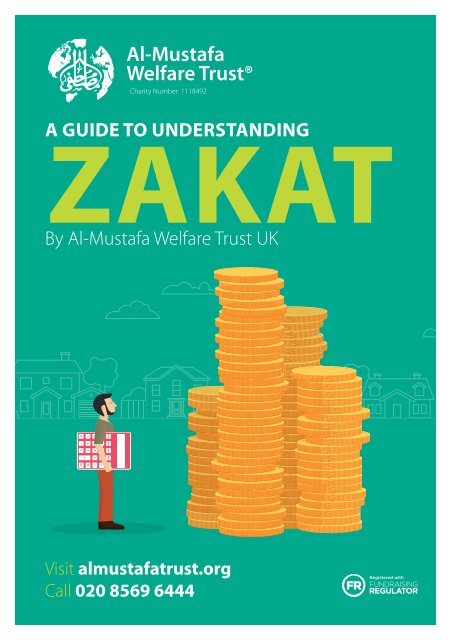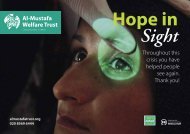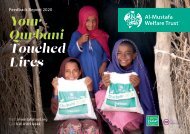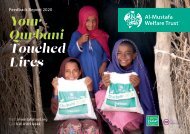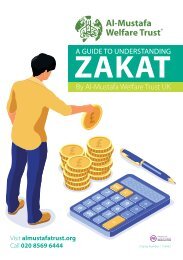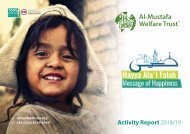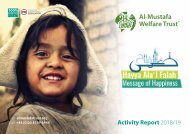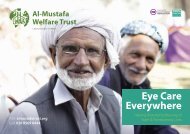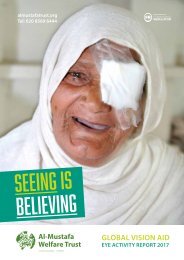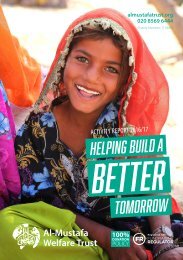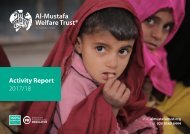Create successful ePaper yourself
Turn your PDF publications into a flip-book with our unique Google optimized e-Paper software.
Al-Mustafa<br />
Welfare Trust®<br />
Charity Number: 1118492<br />
A GUIDE TO UNDERSTANDING<br />
ZAKAT<br />
By Al-Mustafa Welfare Trust UK<br />
Visit almustafatrust.org<br />
Call 020 8569 6444
2.5%<br />
AL MUSTAFA WELFARE TRUST:<br />
YOUR ZAKAT PARTNER<br />
This short guide on <strong>Zakat</strong> has been produced by Al-Mustafa Welfare Trust<br />
as an introduction and explanatory text on this fundamental, but sometimes<br />
misunderstood and neglected pillar of Islam. Al-Mustafa has been serving the<br />
Muslim community as a trusted channel of <strong>Zakat</strong> distribution since its original<br />
founding in 1983.<br />
Last year alone we distributed zakat in 12 countries funding 13 major projects and<br />
supporting 113,441 people. We provided emergency relief, such as food, clothing, winter<br />
items, hygiene kits, shelters and cataract surgeries to over 200,000 people in countries<br />
including Pakistan, Bangladesh, Afghanistan, Somalia, Sudan, Kenya, Syria, Iraq, Palestine<br />
and India.<br />
Alhamdu’Lillah, your <strong>Zakat</strong> has the power to transform people’s lives, turning them from <strong>Zakat</strong><br />
recipients into <strong>Zakat</strong> givers Insha’Allah, this should be our goal as a community.<br />
OUR AIMS<br />
We believe that every valuable pound of <strong>Zakat</strong> paid by Muslims in the UK should be diligently<br />
delivered to the most needy of recipients with transparency and care. We also strive to ensure<br />
that those living in our midst who are eligible to receive <strong>Zakat</strong> are not forgotten and that they are<br />
supported in the most efficient way possible. AMWT distributes 100% of its <strong>Zakat</strong> funds in line with<br />
the Qur’an and Sunnah, with its <strong>Zakat</strong> policies and practices being authenticated and audited by<br />
an independent Shari’ah panel of scholars.<br />
WHAT IS<br />
ZAKAT?<br />
<strong>Zakat</strong> is an obligatory act of worship that requires Muslims who<br />
possess wealth at or above a certain threshold, called the Nisab in<br />
Arabic to donate a share of that wealth, normally 2.5%, to those<br />
who are entitled.<br />
From an Islamic perspective It is a right<br />
that the needy have over those blessed<br />
with wealth. The Nisab was set by the<br />
Prophet Muhammad (pbuh) at a rate<br />
equivalent to 87.48 grams of gold and<br />
612.36 grams of silver. Grammatically the<br />
word <strong>Zakat</strong> is associated with purification<br />
and growth. The third of the five pillars in<br />
Islam, its significance is such that in the<br />
Qur’an it is mentioned 28 times alongside<br />
establishment of the Salat, the daily prayer.<br />
Allah (swt) reminds us:<br />
Take from their wealth a charity by which<br />
you purify them and cause them increase,<br />
and invoke Allah ‘s blessings upon them.<br />
Indeed, your invocations are reassurance<br />
for them. And Allah is Hearing and<br />
Knowing. [Al Qur’an 9:103]<br />
Al-Mustafa Welfare Trust<br />
www.almustafatrust.org/zakatcalculator<br />
PLEASE<br />
DONATE<br />
020 8569 6444<br />
almustafatrust.org<br />
100%<br />
DONATION<br />
POLICY
The Significance of<br />
<strong>Zakat</strong><br />
Islam encourages Muslims to seek halal<br />
employment and take part in trade and<br />
business activity to earn sustenance. But<br />
in order for commerce and individual<br />
endeavour to benefit society, Islam places<br />
several obligations on those involved in the<br />
creation of wealth. Amongst these is the<br />
sacred obligation of <strong>Zakat</strong>, a divine directive<br />
of philanthropy and humanity. Scholars state<br />
that the giving of <strong>Zakat</strong> has both an outer and<br />
an inner dimension.<br />
The inner dimension subdues the ego,<br />
helping Muslims to overcome the<br />
imperfections of selfishness and greed. The<br />
outer dimension involves the purification of<br />
a Muslim’s wealth and helping those in need.<br />
Remember, our faith dictates that by paying<br />
our <strong>Zakat</strong> we are in fact increasing our wealth,<br />
not diminishing it!<br />
Who is Eligible<br />
to Pay <strong>Zakat</strong>?<br />
Those required to pay <strong>Zakat</strong> must be:<br />
R<br />
R<br />
R<br />
R<br />
Adult: Having reached the age of puberty<br />
Muslim: <strong>Zakat</strong> is not obliged upon<br />
non-Muslims<br />
Sane: Be of sound mind<br />
Sahib-un-Nisaab: In complete ownership<br />
of the Nisab<br />
Please note that the three schools of thought<br />
(Shafi, Hanbali & Maliki) other than the Hanafi<br />
school, state that <strong>Zakat</strong> should be paid on<br />
qualifying wealth owned by those of unsound<br />
mind and children.<br />
Who receives <strong>Zakat</strong>?<br />
‘<strong>Zakat</strong> expenditures are only for the poor<br />
and for the needy and for those employed to<br />
collect <strong>Zakat</strong> and for bringing hearts together<br />
[for Islam] and for freeing captives and for<br />
those in debt and for the cause of Allah and<br />
for the traveller - an obligation by Allah. And<br />
Allah is Knowing and Wise.’ [Al Qur’an 9:60]<br />
In these divine verses, Allah (swt) has fixed the<br />
eight categories of recipients of <strong>Zakat</strong>, there is<br />
a consensus amongst Islamic jurists that the<br />
disbursement of <strong>Zakat</strong> is solely confined to<br />
these eight recipients.<br />
1. The poor<br />
2. The needy<br />
3. Those employed to administer <strong>Zakat</strong><br />
4. Those whose hearts are to be reconciled<br />
5. Those in slavery<br />
6. Those in debt<br />
7. In the way of Allah<br />
8. The destitute traveller<br />
The Fuqara and Masakeen are the extremely<br />
poor and are defined as those whose<br />
<strong>Zakat</strong>able assets are valued below the Nisab<br />
level and whose surplus non-<strong>Zakat</strong>able assets<br />
are also valued below the Nisab level. Surplus<br />
assets are defined as any non-<strong>Zakat</strong>able assets<br />
that are never used. Someone whose surplus<br />
assets are valued above the Nisab level, and<br />
who also has <strong>Zakat</strong>able assets valued below<br />
the Nisab level neither pays nor receives<br />
<strong>Zakat</strong>.<br />
Those whose hearts are to be reconciled,<br />
refers to the poor and needy Muslims who<br />
are given Zakah for the express purpose of<br />
strengthening their hearts and making them<br />
more inclined towards Islamic practices.<br />
In reference to those in debt, he Arabic word<br />
Gharimeen is the singular of Gharim. It means<br />
debtor. The verse refers to a specific type of<br />
debtor, the one who is poor. A debtor can<br />
only be said to be poor and thus eligible to<br />
be the recipient of <strong>Zakat</strong> if their net assets, the<br />
difference between their assets and liabilities<br />
is below the level of nisaab.<br />
The category in the Way of Allah, or in<br />
Arabic, Fi Sabilillah, as interpreted from the<br />
narration of the Companions of the Prophet<br />
Muhammed (pbuh), expressly define this as<br />
either for those justly struggling in the Path<br />
of Allah or for the pilgrims of Hajj. A small<br />
number of Muslim jurists have interpreted<br />
and extended the meaning of Sabilillah to all<br />
good acts enjoined by the Shariah. However,<br />
these Jurists have specifically described<br />
that the recipients must be poor and needy<br />
persons and are unanimous on the point<br />
that <strong>Zakat</strong> cannot be spent on projects<br />
that would be beneficial to the Muslim<br />
Community, such as the building of hospitals,<br />
Masjids, roads, bridges and the like.<br />
The final category of the destitute traveller,<br />
refers to someone who though of good<br />
means at his place of residence, is in need<br />
during his journey. It is permissible to<br />
give <strong>Zakat</strong> to such a traveller to the extent<br />
of his needs, but nothing that exceeds his<br />
requirements. It is preferable for such a<br />
traveller to borrow funds if he is able to do so,<br />
than to accept <strong>Zakat</strong>.<br />
Examples of who is entitled to receive <strong>Zakat</strong>:<br />
EXAMPLE 1<br />
Aminah is a poor widow who owns the<br />
house in which she lives, but she only has<br />
£100 worth of <strong>Zakat</strong>able assets. Hence<br />
she is not liable to pay <strong>Zakat</strong>. She does<br />
however possess some surplus items<br />
which she never uses, such as a second<br />
sofa set and some cooking utensils. The<br />
value of these surplus items is £100,<br />
which when added to her <strong>Zakat</strong>able<br />
assets, comes to a total of £200. Because<br />
this total figure is less than the Nisab,<br />
Aminah can receive <strong>Zakat</strong>.<br />
EXAMPLE 2<br />
Waqas has valued his <strong>Zakat</strong>able assets at<br />
£200, hence he is not liable to pay <strong>Zakat</strong>.<br />
Waqas also has many unused, surplus<br />
items whose value easily exceeds the<br />
Nisab threshold. Waqas, therefore, neither<br />
pays nor can receive <strong>Zakat</strong>.<br />
?<br />
DID YOU<br />
KNOW?<br />
<strong>Zakat</strong> is not just a central pillar<br />
of Islam, it is also a revolutionary<br />
concept which aims to ease the<br />
suffering of millions around the<br />
world. <strong>Zakat</strong> is a right that the<br />
poor have over us, “..those in<br />
whose wealth there is a<br />
recognised right for the needy<br />
and the poor”<br />
[Al Qur’an 70:24-25]<br />
Al-Mustafa Welfare Trust<br />
www.almustafatrust.org/zakatcalculator<br />
PLEASE<br />
DONATE<br />
020 8569 6444<br />
almustafatrust.org<br />
100%<br />
DONATION<br />
POLICY
<strong>Zakat</strong> al Fitr:<br />
Celebrating with<br />
Charity<br />
Malak <strong>Zakat</strong> al Fitr or Sadaqat al Fitr is a<br />
charitable donation towards the poor, made<br />
on the festive occasion of Eid al Fitr at the end<br />
of the month of Ramadan. It is a requirement<br />
of every Muslim, adult and child, as long as<br />
they have the means to pay. The head of<br />
the family may pay the required amount for<br />
other members. It needs to be paid during<br />
Ramadan before the month ends and before<br />
the Eid prayers at the very latest.<br />
This is a specific time frame that all Muslims<br />
must abide by, a late payment is invalid and<br />
the obligation can not be compensated. It is<br />
measured as a quantity the Prophet<br />
Muhammad (pbuh) described as one saa’ of<br />
food. One saa’ is equivalent to four madd. A<br />
madd is the amount that can be scooped up<br />
when one puts their hands together. If we<br />
translate this into a monetary value based on<br />
the price of staple foods such as flour or rice, it<br />
is approximately £4 per person.<br />
?<br />
DID YOU<br />
KNOW?<br />
If the top ten wealthiest people<br />
in the world paid their zakat<br />
– just 2.5% of their wealth, it<br />
would amount to a<br />
staggering £8 billion! This<br />
amount of money would have a<br />
major impact on tackling world<br />
poverty.<br />
What types of<br />
wealth does <strong>Zakat</strong><br />
include?<br />
Assets to include in your zakat calculation<br />
are cash in hand and in bank accounts,<br />
shares, pensions, gold, silver, business<br />
goods, crops and cattle. You do not need<br />
to count personal items such as your<br />
home, furniture, cars, food, clothing, which<br />
are not used for business purposes. <strong>Zakat</strong><br />
is also due on property that is owned for<br />
investment. Visit www.almustafatrust.<br />
org/zakatcalculator for details.<br />
When should<br />
<strong>Zakat</strong> be paid?<br />
Your <strong>Zakat</strong> year starts on the date your wealth<br />
first equalled or exceeded the Nisab. <strong>Zakat</strong><br />
should then be calculated and paid after one<br />
year has passed and every year thereafter on<br />
that specific date. If you cannot remember<br />
the date you first became owner of the Nisab,<br />
then the date should be estimated. If this<br />
is not possible, then a specific Islamic date<br />
should be selected randomly and adhered<br />
to annually. Paying <strong>Zakat</strong> in Ramadan is not<br />
necessary, although the virtue of giving<br />
charity in this blessed month guarantees<br />
greater rewards. <strong>Zakat</strong> should be dispensed as<br />
soon as possible once it becomes due. At the<br />
very latest, <strong>Zakat</strong> should be dispensed one<br />
Islamic year after the due date as it is a sin to<br />
delay disbursement without a valid reason.<br />
Where should<br />
<strong>Zakat</strong> be distributed?<br />
As Muslims living in the UK, it is important<br />
that we balance our giving between local and<br />
international beneficiaries, as there are edicts<br />
to give <strong>Zakat</strong> locally if deserving recipients<br />
exist. This should be assessed on the actual<br />
needs of the poor, their actual access to<br />
welfare and whether the <strong>Zakat</strong> could mean<br />
the difference between continued poverty or<br />
life and death.<br />
How do I<br />
calculate my <strong>Zakat</strong>?<br />
You can visit www.almustafatrust.org/<br />
zakatcalculatorto make your calculation<br />
online in a few very easy steps.<br />
Can I spread my<br />
payments<br />
throughout the year?<br />
Yes, <strong>Zakat</strong> can be paid monthly by setting up<br />
a regular monthly payment such as a direct<br />
debit. AMWT can help you to do this with<br />
our zakat-eligible sponsorship programmes,<br />
suitable for a range of zakat levels. These<br />
sponsorships can change lives and help build<br />
futures. Find out more about our<br />
zakat-eligible sponsorships at:<br />
www.almustafatrust.org/zakatcalculator<br />
What if I miss a<br />
<strong>Zakat</strong> payment?<br />
If <strong>Zakat</strong> has not been paid in previous years,<br />
whether through negligence or ignorance or<br />
error, then an honest attempt must be made<br />
to calculate the payment owed. This must<br />
then be paid as a matter of urgency.<br />
Can I Gift Aid my<br />
<strong>Zakat</strong> payment?<br />
Gift Aid is a valuable tax concession that does<br />
not cost donors a penny. It increases the<br />
value of donations made to registered<br />
charities by 25% and can be made by all<br />
UK tax payers. It is simple to allow AMWT to<br />
claim Gift Aid – just tick the box on the web<br />
page or form when you make a donation.<br />
What are tola,<br />
bhori and vori?<br />
Tola is a unit of weight used in the Asian<br />
subcontinent that is equal to the weight of a<br />
silver rupee. It is also known as bhori or vori.<br />
One tola is equal to 11.66 grams. Therefore,<br />
87.48 grams of gold is equivalent to 7.5 tola.<br />
We hope you have found the<br />
Al-Mustafa Trust <strong>Guide</strong> to Understanding<br />
<strong>Zakat</strong> helpful. For further information on<br />
<strong>Zakat</strong> please call the AMWT team who<br />
are here to assist.<br />
Al-Mustafa Welfare Trust<br />
www.almustafatrust.org/zakatcalculator<br />
PLEASE<br />
DONATE<br />
020 8569 6444<br />
almustafatrust.org<br />
100%<br />
DONATION<br />
POLICY
?<br />
For further information on <strong>Zakat</strong> please call<br />
the AMWT team on 020 8569 6444 or visit:<br />
www.almustafatrust.org/zakatcalculator<br />
Design & Print MDUK Media 020 8799 4455<br />
Al-Mustafa<br />
Welfare Trust®<br />
Serving humanity since 1983<br />
Charity Number: 1118492<br />
110 High Street<br />
Hounslow TW3 1NA<br />
Tel: 020 8569 6444<br />
www. almustafatrust.org


